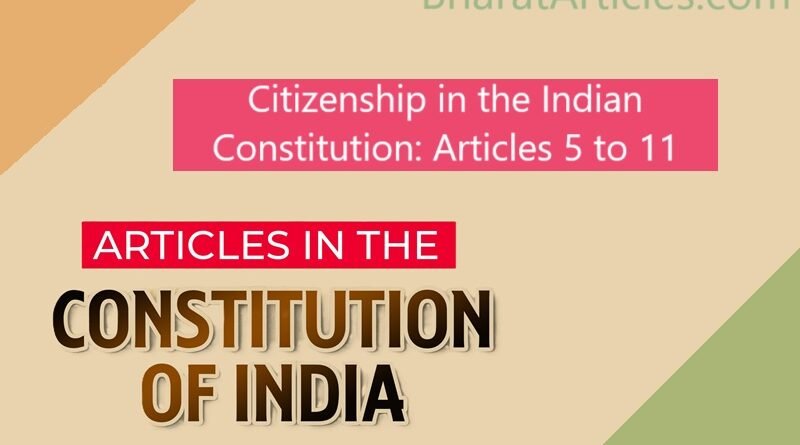Citizenship in the Indian Constitution: Articles 5 to 11
Citizenship is a critical concept that establishes the relationship between an individual and the state. It provides individuals with certain rights, privileges, and duties while defining their allegiance to the nation. The Indian Constitution, under Part II, encompasses Articles 5 to 11, which deal with citizenship at the commencement of the Constitution and empower the Parliament to regulate matters concerning citizenship thereafter.
Article 5: Citizenship at the Commencement of the Constitution
Article 5 outlines the criteria for individuals who were deemed to be citizens of India when the Constitution came into effect on January 26, 1950. It recognizes citizenship based on domicile and connections to India through birth, descent, or residence.
Key Provisions:
- Domicile in India: A person domiciled in India at the commencement of the Constitution is considered a citizen.
- Birth in India: Individuals born in India automatically qualify for citizenship.
- Parentage: A person whose either parent was born in India is eligible for citizenship.
- Residency: Individuals who have been ordinarily residing in India for at least five years before the commencement of the Constitution are considered citizens.
Article 6: Rights of Citizenship for Persons Migrating from Pakistan to India
Article 6 grants citizenship to individuals who migrated to India from Pakistan under specific conditions.
Key Provisions:
- Migration Before July 19, 1948: Individuals who migrated to India from Pakistan before this date are granted citizenship if:
- They were born in India.
- Either of their parents was born in India.
- They have been ordinarily residing in India since their migration.
- Migration After July 19, 1948: Individuals who migrated after this date can become citizens if:
- They were registered as citizens of India by an officer appointed for the purpose.
- They have been residing in India for at least six months before applying for registration.
Article 7: Rights of Citizenship for Persons Migrating to Pakistan
Article 7 deals with individuals who migrated to Pakistan but later returned to India. Such individuals are often referred to as “returning migrants.”
Key Provisions:
- A person who migrated to Pakistan after March 1, 1947, but returned to India under a permit for resettlement or permanent return, can be granted citizenship.
- They must fulfill the requirements of residence and registration as prescribed by the law.
Article 8: Rights of Citizenship for Overseas Indians
Article 8 provides for the citizenship of persons of Indian origin residing outside India.
Key Provisions:
- Eligibility: A person who, or whose parent or grandparent, was born in India as defined under the Government of India Act, 1935.
- Registration: Such individuals can register as Indian citizens through the diplomatic or consular office of India in the country of residence.
Article 9: Termination of Citizenship
Article 9 addresses the loss of Indian citizenship due to voluntary acquisition of foreign citizenship.
Key Provisions:
- A person ceases to be an Indian citizen if they voluntarily acquire the citizenship of another country.
- This provision ensures that India does not permit dual citizenship.
Article 10: Continuance of Rights of Citizenship
Article 10 guarantees the continuance of citizenship rights to individuals recognized as citizens under the provisions of Articles 5 to 9, subject to any laws made by Parliament.
Key Provisions:
- Uninterrupted Citizenship: As long as the Parliament does not make any laws affecting citizenship, the rights of existing citizens remain intact.
Article 11: Parliament’s Power to Regulate Citizenship
Article 11 empowers Parliament to enact laws concerning the acquisition, termination, and other matters related to citizenship.
Key Provisions:
- Legislative Authority: The Parliament has the exclusive power to frame laws on citizenship.
- Key Legislation: The Citizenship Act of 1955, enacted under Article 11, governs various aspects of Indian citizenship, including acquisition, termination, and supplemental provisions.
The Citizenship Act, 1955
To operationalize Article 11, the Citizenship Act, 1955, was enacted. It provides detailed provisions regarding the modes of acquiring and losing citizenship. The key features include:
Modes of Acquiring Citizenship:
- By Birth: Individuals born in India, subject to specific conditions.
- By Descent: Citizenship granted to those born outside India to Indian parents, provided certain criteria are met.
- By Registration: For persons of Indian origin or spouses of Indian citizens, following prescribed procedures.
- By Naturalization: For foreign nationals who have resided in India for a specified period and meet other criteria.
- By Incorporation of Territory: Citizenship granted when new territories are incorporated into India.
Termination of Citizenship:
- Renunciation: Voluntary surrender of Indian citizenship.
- Termination: Automatic loss of citizenship upon acquiring foreign nationality.
- Deprivation: Revocation of citizenship by the government under certain circumstances, such as fraud.
Challenges and Controversies:
While Articles 5 to 11 and subsequent legislation have defined citizenship effectively, challenges persist:
- Stateless Persons: Individuals who do not meet any criteria under the law may become stateless.
- Dual Citizenship: India does not allow dual citizenship, which limits options for Indians living abroad.
- Refugee Issues: Addressing the citizenship rights of refugees and migrants remains a contentious issue.
- Citizenship Amendment Act (CAA), 2019: The amendment to the Citizenship Act stirred nationwide debate regarding its implications on secularism and equality.
Read This: Landmark Judgments in India
Conclusion:
Articles 5 to 11 of the Indian Constitution lay the foundational framework for citizenship, balancing individual rights with national interests. While the Constitution provides clarity on who is an Indian citizen at its commencement, it also entrusts Parliament with the responsibility to address evolving challenges. The dynamic nature of citizenship laws reflects India’s commitment to adapt to changing socio-political realities while preserving the principles enshrined in its Constitution.

